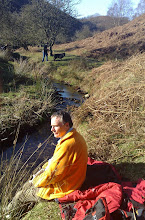Listen to criticism and try to learn from it, but don’t live or die by it. When I was in college, I would always take my best reviewed poem from the previous class and submit it to the professor for the next class. Invariably, the next professor hated the poem, and could provide good reasons why it failed.
When you write a good poem, one you really like, immediately write another. Maybe that one poem was your peak for the night, bit maybe you’re on a roll. There’s only one way to find out.
The bigger your theme, the more important the details are. A poem with Love, Destiny, Hate or other huge themes in the title already has two strikes against it (and I like love poems).
Say what you want to say. Let your readers decide what your poem means.
Feel free to write a bad poem.
That one perfect line in a thirty-line poem may be what makes it all worthwhile. It may also be what is ruining the rest of your poem. Keep an eye on it.
Don’t explain everything.
Untitled poems are like unnamed children.
People will remember an image long after they’ve forgotten why it was there.
Develop your voice. Get comfortable with how you write.
There are many excuses not to write. Try using writing as an excuse not to do other things.
The more you read, the more you learn. Read poetry often.
The more you write, the more you develop. Write poetry often.
Poems that focus on form are rarely my favorites, but most of my favorite poets learned how to write in forms before they discarded them. Writing in forms is a challenge. It makes you think.
Don’t be afraid to write from a different point of view. Write a poem that says exactly the opposite of what you believe. If you can, do it without irony.
When you cannot write, lie on the floor a while, go for a walk, or at least twirl around in a circle. Do something that changes your perspective.
Write in different places. Keep a notebook. Write in a park or on a street-corner or in an alley. You don’t have to write about the place, but it will influence you whether you do or not.
Listen to talk radio while you write. Listen to the people who call. Great characters and voices emerge that way.
If you don’t like a poem or poet you read, figure out exactly why. It may reflect something you don’t like about your own poetry.
When nothing is coming, start writing very fast. Write down any and every word, phrase or sentence that comes to mind. Do that for about a minute before you go back to working on your poem. I call this trick flushing. Feel free to use anything you came up with, but the purpose of flushing is to clear your head.
 <Make a list of poems you can remember specific lines from. Go back and read those poems. Figure out why they stuck with you.
<Make a list of poems you can remember specific lines from. Go back and read those poems. Figure out why they stuck with you.
Keep a dream journal. Dreams are your mind at it’s most creative so pay attention to them. Don’t feel you have to write a poem about your dreams unless one truly inspires you. The main goal is to see what thoughts the dreams lead you to.
Analyze other writer’s poems. Figure out what works, what doesn’t work, and why. Think about how you would work with the same material and concepts.
Use humor, irony, and melodrama, but don’t abuse them.
Write the worst poem you can possibly write. Use clichés, use pretentious words, and beat your reader over the head with your point. Felt good, didn’t it? Now get back to work. The point is, don’t be afraid to write a bad poem. Every great poet has written a bad poem. Most great poets have written hundreds, even thousands of bad poems. The great poets kept writing though, and so should you. If it takes a hundred bad poems to produce a poem you like, finish those hundred poems.
Limericks can be fun too.
Every line of a poem should be important to the poem, and interesting to read. A poem with only 3 great lines should be 3 lines long.
Poems should progress. There should be a reason why the first stanza comes before the second, the second before the third, and so on.
Follow your fear. Don’t back away from subjects that make you uncomfortable, and don’t try to keep your personal demons off the page. Even if you never publish the poems they produce, you have to push yourself and write as honestly as possible.
Find a way to publish your poems. Sooner or later you have to send your babies out into the world to find their way. Emily Dickinson was a fluke. Most people who don’t publish while they’re alive will never be seen or heard of — no matter how great their poems.
Buy poetry books, especially books by current writers. Give back to the poetry community by reading (and paying for) the works of others.
Go to poetry readings. Check your local arts publications for upcoming events. Almost any sizable town has readings every week or every other week. This is a great opportunity to meet poets and people who care about poetry.
When you go to readings, donate money and buy books if you can.
Host a poetry event or organize a reading.
If you want to swap poetry and criticism with your peers, form your own group. Many local arts publications let you list your group for free.
Publish your own poetry journal or web site. Even a few sheets of paper stapled together gets the word out.
Whatever else you do, keep writing.

No comments:
Post a Comment